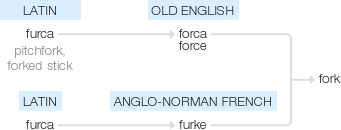Fork
Old English forca, force (denoting a farm implement), based on Latin furca ‘pitchfork, forked stick’; reinforced in Middle English by Anglo-Norman French furke (also from Latin furca ).
wiktionary
From Middle English forke(“digging fork”), from Old English force, forca(“forked instrument used to torture”), from Proto-West Germanic *furkō(“fork”), from Latin furca(“pitchfork, forked stake; gallows, beam, stake, support post, yoke”), of uncertain origin. The Middle English word was later reinforced by Anglo-Norman, Old Northern French forque (= Old French forche whence French fourche), also from the Latin. Cognate also with North Frisian forck(“fork”), Dutch vork(“fork”), Danish fork(“fork”), German Forke(“pitchfork”). Displaced native gafol, ġeafel, ġeafle(“fork”), from Old English.
In its primary sense of “fork”, Latin furca appears to be derived from Proto-Indo-European *ǵʰerk(ʷ)-, *ǵʰerg(ʷ)-(“fork”), although the development of the -c- is difficult to explain. In other senses this derivation is unlikely. For these, perhaps it is connected to Proto-Germanic *furkaz, *firkalaz(“stake, stick, pole, post”), from Proto-Indo-European *perg-(“pole, post”). If so, this would relate the word to Old English forclaspl(“bolt”), Old Saxon ferkal(“lock, bolt, bar”), Old Norse forkr(“pole, staff, stick”), Norwegian fork(“stick, bat”), Swedish fork(“pole”).
fork (plural forks)
etymonline
fork (n.)
Old English forca, force "pitchfork, forked instrument, forked weapon," from a Germanic borrowing (Old Frisian forke, Dutch vork, Old Norse forkr, Danish fork) of Latin furca "two-pronged fork; pitchfork; fork used in cooking," a word of uncertain origin. Old English also had forcel "pitchfork." From c. 1200 as "forked stake or post" (as a gallows or prop).
Table forks are said to have been not used among the nobility in England until 15c. and not common until early 17c. The word is first attested in this sense in English in an inventory from 1430, probably from Old North French forque (Old French furche, Modern French fourche), from the Latin word. Of rivers, from 1753; of roads, from 1839. As a bicycle part from 1871. As a chess attack on two pieces simultaneously by one (usually a knight), it dates from 1650s. In old slang, forks "the two forefingers" is from 1812.
fork (v.)
early 14c., "to divide in branches, go separate ways," also "disagree, be inconsistent," from fork (n.). Transitive meaning "raise or pitch with a fork" is from 1812. Related: Forked; forking. The slang verb phrase fork (something) over is from 1839 (fork out) "give over" is from 1831). Forking (n.) in the forensic sense "disagreement among witnesses" is from c. 1400.
